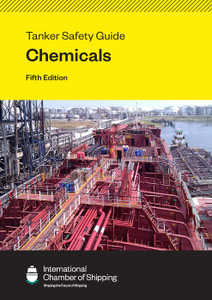
This is a comprehensive guide to chemical tanker cargo operations, covering international regulations, cargo handling and hazards, environmental protection, emergency response, safety management, tank cleaning and ship design and equipment. It is a source of reference for serving officers and managers, as well as those undertaking advanced training as required by the STCW Convention.
Student eBook version also available at £75 [https://www.witherbyseamanship.com/chemical-tanker-operations-for-the-stcw-advanced-training-course-ebook.html,here,SameWindow]
This publication sets out the chemical cargo groups and the applicable regulations. It provides detailed information on cargo hazards and the operational safeguards required to protect personnel and the environment. It also looks at chemical tanker construction and design, with reference to the IBC Code, together with the operation of cargo handling equipment and systems.
A separate chapter on safety discusses the ship’s safety management system (SMS), risk assessment, enclosed space entry, permits to work and the use of personal protective equipment (PPE). There is also advice on emergency response and onboard drills.
In addition, practical guidance is provided on tank cleaning, cargo handling operations and monitoring to be undertaken on the voyage. Bullet lists are used to clarify onboard procedures and to help ensure no step is overlooked.
Each chapter includes references to relevant regulations, codes and industry guidelines.
The book is written as a practical sequential prompt, an aide-mémoire for serving officers and managers, and as a consolidated study guide for those undertaking the advanced training for chemical tanker cargo operations as required by the STCW Convention. The book assumes that the reader has successfully completed basic training for oil and chemical tanker cargo operations.
1 – Introduction
1.1 Purpose and Scope
1.2 General Introduction
1.3 The STCW Requirement
2 – Chemical Cargoes and the Basic Chemistry
2.1 Chemical Cargo Groups
2.2 The Basic Chemistry of Bulk Liquid Chemical Cargoes
2.3 Petrochemical Products and Manufacturing
3 – The Regulations
3.1 The International Maritime Organization
3.2 The International Conventions
3.3 Certification and Survey
3.4 Insurance
4 – Chemical Cargo Hazards
4.1 Safety Data Sheets
4.2 Fire and Explosion
4.3 Toxicity, Corrosives and Reactivity
4.4 Health Hazards
4.5 Personal Protective Equipment (PPE)
4.6 Environmental Hazards
5 – Protecting the Environment
5.1 MARPOL Annex II and the IBC Code
5.2 Air Pollution
6 – Chemical Tanker Design and Construction
6.1 The IBC Code
6.2 Ship Types
6.3 Cargo Tanks
6.4 Tank Design Features, Materials of Construction and Coatings
6.5 Segregation and Separation
6.6 Electrical Installations
7 – Cargo Handling Equipment and Systems
7.1 System Segregation
7.2 Cargo Pumps
7.3 Pipelines and Valves
7.4 Cargo Tank Venting
7.5 Inert Gas
7.6 Cargo Heating Systems
7.7 Cargo Cooling Systems
7.8 Instrumentation
7.9 Tank Washing Systems
7.10 Auxiliary Equipment
8 – Ballast Water Systems
8.1 Ballast Tank Arrangement
8.2 Ballast Pumping System
8.3 Ballast Water Management
9 – Safety
9.1 Safety Management System
9.2 Ship Safety
9.3 Personal Safety
9.4 Enclosed Space Entry
9.5 Permit to Work (PTW)
10 – Emergency Response
10.1 Organisation and Planning
10.2 Emergency Drills
11 – The Loading Port
11.1 Voyage Orders
11.2 Voyage Planning
11.3 Preparation
11.4 Pre-arrival Meetings
11.5 Arrival and the Ship/Shore Liaison
11.6 Loading Operations
11.7 Cargo Sampling
11.8 Cargo Calculations
11.9 Final Checks – Preparation for Sea
12 – The Voyage
12.1 Cargo in Motion
12.2 Cargo Containment
12.3 Cargo Care and Safe Carriage
13 – The Discharge Port
13.1 Discharge Port Planning
13.2 Preparing the Ship
13.3 Pre-arrival Meetings
13.4 Arrival and the Ship/Shore Liaison
13.5 Discharge Operations
13.6 Completion of Discharge
13.7 Prewashing Before Departure
14 – Tank Cleaning
14.1 Tank Atmosphere
14.2 Personal Protective Equipment
14.3 Fundamental Tank Cleaning Practice
14.4 The Tank Cleaning Process
14.5 Tank Cleaning Plan
14.6 Use of Tank Cleaning Additives
14.7 Tank Cleaning Progress
14.8 Gas Freeing
14.9 Tank Cleaning in Port
14.10 After Cleaning
Appendices
1 Vegetable and Animal Oils and Fats
2 Tank Cleanliness
The CDI is a chemical industry organisation, incorporated under the law of the Netherlands as the Stichting Chemical Distribution Institute (CDI) and operates as a non-profit making foundation.
CDI is managed by a Board of Directors consisting of seven individuals nominated by the participating chemical companies. The Board of Directors establishes policy and is responsible for overall affairs of the foundation. Individual Executive Boards are elected to oversee and direct the staff managing day to day activities for the Marine, Terminals and Marine Packed Cargo Schemes.
- Number of Pages:
- 208
- ISBN:
- 9781856097567
- Published Date:
- January 2018
- Binding Format:
- Hardback
- Book Height:
- 305 mm
- Book Width:
- 218 mm
- Weight:
- 1.4 kg
- Author:
Chemical Distribution Institute
- Preview:
- Yes
- Publication Date:
- January 2018




